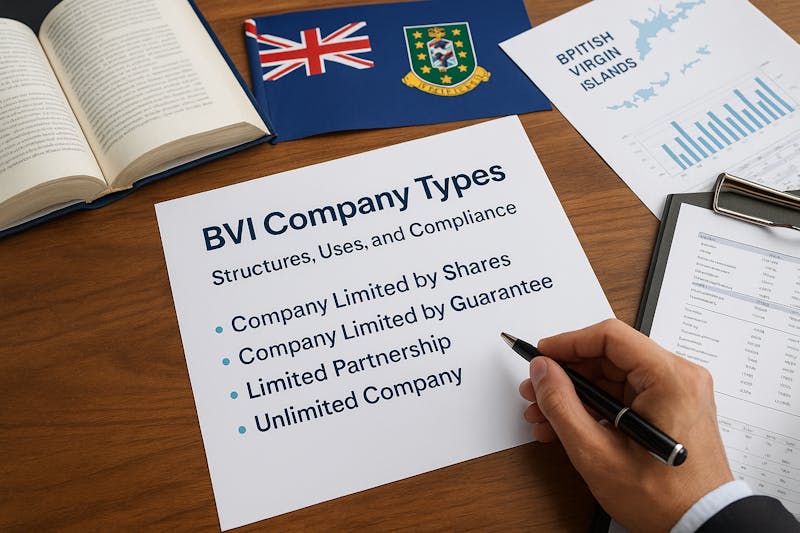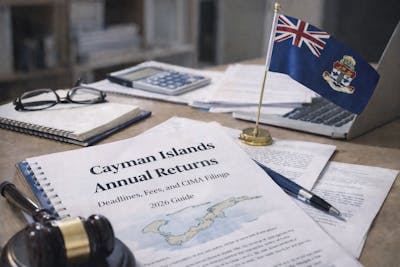The BVI Business Companies Act, 2004 allows five company forms: company limited by shares, company limited by guarantee (with or without shares), and unlimited company (with or without shares).
International Business Companies are not a current type. The IBC Act 1984 was replaced; legacy IBCs were re-registered as BVI business companies.
Special structures include Segregated Portfolio Companies under the SPC Regulations 2018 and Restricted Purpose Companies for structured finance.
BVI offers modern company law, tax neutrality for companies, no exchange control legislation, and a respected regulator in the BVI Financial Services Commission.
Types of BVI Companies Under the Business Companies Act
Under the BVI Business Companies Act, 2004, there are five core company types:
- Company limited by shares
- Company limited by guarantee not authorised to issue shares
- Company limited by guarantee authorised to issue shares
- Unlimited company not authorised to issue shares
- Unlimited company authorised to issue shares
International Business Companies were migrated into the BCA regime.
Main Characteristics of Each BVI Company Type
Company Limited by Shares
Liability is limited to any unpaid amounts on shares. Multiple share classes and bespoke rights can be set out in the Memorandum and Articles of Association (M&A). Only one director and one shareholder are required.
A Register of Directors (ROD) must be filed with the Registrar. For a fee, anyone can obtain names of current directors only (no addresses or dates of birth). Historical and shareholder details remain confidential.
Common uses: Holding and investment vehicles, trading or joint ventures, financing and treasury companies, intellectual property ownership.
Key 2025 compliance points
- Appoint the first director within 15 days of incorporation.
- File register of directors within 15 days of that appointment.
- File the annual financial return (AFR) with your registered agent within 9 months after the financial year-end. Initial extensions for first filings ceased 30 June 2025 for 31 Dec 2023 year-ends.
Company Limited by Guarantee (With or Without Shares)
Members give a fixed guarantee payable only on winding-up. With shares, the structure blends guarantee membership and shareholder rights.
Voting and guarantee terms are set in the memorandum and articles.
Common uses: Associations, non-profits, and membership bodies.
Unlimited Company (With or Without Shares)
Members have unlimited liability. Used rarely for specialist arrangements where counter-parties value additional recourse. Can be formed with or without share capital.
Special BVI Structures to Consider
Segregated Portfolio Company (SPC)
A single company limited by shares with separate segregated portfolios. Assets and liabilities of each portfolio are ring-fenced by statute. Portfolios are not separate legal entities.
Typical uses: Funds and insurance under the Securities and Investment Business Act, 2010 (SIBA) and the Insurance Act, 2008, and approved non-regulated uses under the Segregated Portfolio Companies (BVI Business Company) Regulations 2018 with FSC approval.
The name must include “Segregated Portfolio Company” or “SPC” before the required company ending.
Restricted Purpose Company (RPC)
A company limited by shares whose memorandum of association specifies narrowly defined and restricted purposes.
RPCs are typically used in structured finance and insolvency-remote transactions, ensuring the company cannot engage in activities outside its stated purposes.
These entities often include “(SPV) Limited” or “(SPV) Ltd” in their names for clarity.
Limited Partnerships (LPs)
Governed by the Limited Partnership Act 2017. An LP has legal personality by default unless the general partner elects to register it without legal personality at formation.
LPs are standard vehicles for private equity and fund structures with flexible GP/LP arrangements.
BVI is tax-neutral, as tax treatment for investors depends on their own jurisdictions.
2025 Compliance Checklist
1. Incorporation
- Incorporate through a licensed registered agent under the BVI Business Companies Act, 2004 (BCA).
- File the Memorandum and Articles of Association (M&A) with the Registrar of Corporate Affairs upon incorporation or continuation.
2. Register of Directors (ROD)
- Appoint the first director within 15 days of incorporation.
- File the ROD within 15 days of that appointment via the registered agent.
- File updates within 30 days of any director change.
3. Register of Members (ROM)
- New companies and continuations (from 2 Jan 2025): file the initial ROM within 30 days of incorporation or continuation; file updates within 30 days of any change.
- Existing companies: must file their first ROM by 1 January 2026.
- The ROM is not public.
- Exemptions: listed companies and FSC-regulated funds. Entities dissolved before 2 Jan 2025 are out of scope.
4. Register of Beneficial Owners (ROBO)
- Under the BVI Business Companies and Limited Partnerships (Beneficial Ownership) Regulations 2024, all in-scope entities must file beneficial ownership details via the VIRRGIN portal.
- New companies and continuations: file within 30 days of incorporation or continuation.
- Existing entities: must comply by 1 January 2026.
- Information is accessible only to the BVI Financial Services Commission (FSC) and competent authorities.
5. Annual Financial Return (AFR)
- Deliver the AFR to your registered agent within 9 months after the financial year-end.
- The one-time filing extension for calendar-year companies ended 30 June 2025.
6. Taxation
- The BVI levies no corporate income, capital gains, or withholding taxes.
- If you employ staff locally, the Payroll Tax Act 2004 applies.
7. Exchange Controls
- The BVI has no exchange-control legislation; funds move freely in and out of the jurisdiction.
Air Corporate can calendar all ROM/ROD/BO/AFR dates and file on your behalf.
How to Pick the Right Structure
| Goal | Best-Fit Options | Why |
|---|---|---|
| Investment holding, IP, trading | Company limited by shares | Flexible share classes and governance; market-standard |
| Multi-strategy platforms | SPC or separate subsidiaries | Statutory portfolio segregation under the SPC Regulations 2018 |
| Associations, clubs | Company limited by guarantee (with/without shares) | Guarantee model fits member bodies |
| Fund GP/LP | Limited Partnership (2017) | Legal-personality election; GP/LP economics |
| Securitisation / insolvency-remote | Restricted Purpose Company | Purposes locked in the memorandum for creditor clarity |
Incorporation Documents: What Your Memorandum and Articles Should Include
When setting up a BVI company, your memorandum and articles of association (M&A) must clearly outline the company’s key details and governance framework. Make sure to include:
- Company name and legal type (e.g., limited by shares, guarantee, or unlimited company).
- Registered office and registered agent as required under the BVI Business Companies Act, 2004.
- Share classes and rights, including voting, dividend, and redemption rights if applicable.
- Guarantee amount and voting rules for companies limited by guarantee.
- Special provisions, such as restricted purposes for RPCs or segregated portfolio clauses for SPCs, are included in the memorandum.
Final Thoughts
The British Virgin Islands offers structures for startups through to complex finance platforms. Each structure carries specific benefits and compliance rules. With sound planning and the right filings, you can leverage the BVI’s stable legal system, FSC oversight, and tax neutrality for long-term growth and asset protection.
Ready to set up your business in the BVI? Consult a professional advisor today to find the proper structure and start your incorporation process with confidence.
FAQs
A BVI company is a legal entity formed under the BVI Business Companies Act, 2004, regulated by the BVI Financial Services Commission (FSC). It’s widely used for international business, asset protection, and investment holding because of its flexible structure, strong privacy, and tax-neutral regime.
As of 30 June 2025, there were about 355,000 BVI business companies on the register (355,024). The total moves with incorporations and liquidations.
Common reasons include tax neutrality, quick incorporation through licensed agents, strong confidentiality (shareholders are not publicly listed and the filed ROM is not public), and a common-law system supported by a respected commercial court and the FSC.






